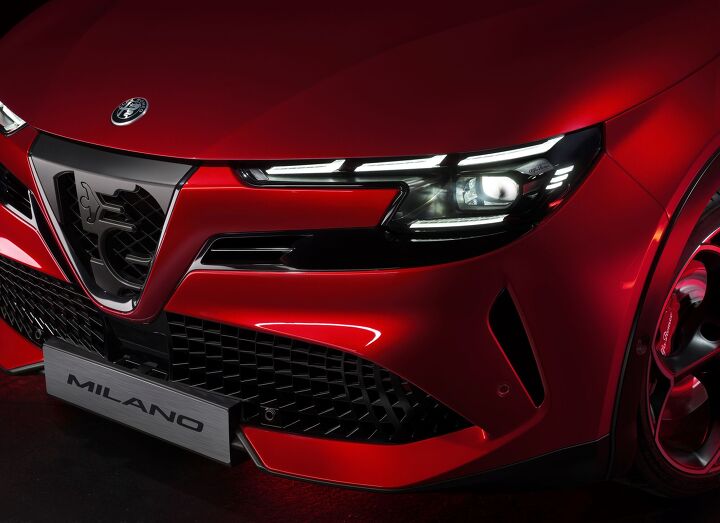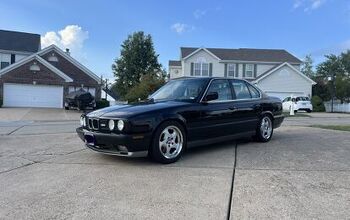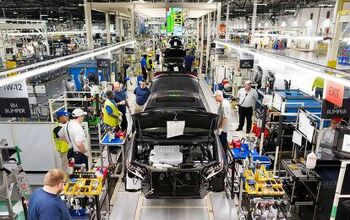Alfa Romeo Milano Renamed ‘Junior’ to Satisfy Italian Law

Following criticisms and potential legal actions stemming from the Italian Minister for Business, Alfa Romeo has opted to rename the recently revealed Milano crossover. The subcompact model will now be called the “Junior,” which sounds like the kind of name someone comes up with for a small car out of sheer desperation.
As previously mentioned, the issue is that the vehicle is being assembled in Poland. Italian Business Minster Adolfo Urso had claimed that the model using the Milano name would be banned due to preexisting legislation that forbids the existence of products stemming from outside the country being marketed as Italian. Since Milano is the name of Alfa’s hometown, giving it to a vehicle assembled in Poland may qualify as taboo.
To remedy the matter, Stellantis swiftly had Alfa Romeo change the name “ in the spirit of promoting mutual understanding.” However, the companies also stated that they believed the crossover’s name met all legal requirements — adding that “there are issues much more important than the name of a new car.”
In a press release, the company stated that it had plenty of great names to choose from and that it wasn’t really a big deal that it felt obligated to swap names. But if you believe that, you also probably believe that Alfa Romeo Junior sounds just as good as Alfa Romeo Milano.
“We are perfectly aware that this moment will remain engraved in the history of the brand. It's a great responsibility but at the same time it's an exciting moment. The choice of the name Alfa Romeo Junior is completely natural, as it is strongly linked to the history of the brand and has been among our favorites and among the public's favorites since the beginning,” Alfa Romeo CEO Jean-Philippe Imparato stated.
“As a team, we are choosing once again to share our passion for the brand and make the product and our customers the priority. We decided to change the name, even though we know that we are not required to do so, because we want to preserve the positive emotion that our products have always generated and avoid any type of controversy. The attention to our new sports compact that we’ve received the past few days is quite exciting as we had an unprecedented number of visits to the online configurator, causing the website to crash for a couple hours.”
However, your author doesn’t really know where the line is drawn on such things and it seems like there may be some gray space within the law itself. For example, loads of Italian automobile brands are presently owned by foreign parent companies. Alfa Romeo is owned by Stellantis — which is partially owned by the French government, the Dutch holding company Exor, and was the result of a merger between the Italian-American Fiat Chrysler Automobiles and France’s PSA Groupe. Lamborghini has likewise been owned by Volkswagen Group for ages and even shares platforms with German automobiles. Fiat, another iconic Italian brand under the Stellantis umbrella, has had facilities located in Eastern Europe churning out cars for decades.
Are those examples all fine under Italian law, provided production remains localized? It’s understandable that the nation wants to keep hold of its cultural impact on the world. But we’ve all been to the grocery store and bought products that appeared Italian, only to read the packaging and find out the truth. Pepperidge Farm Incorporated, headquartered in Norwalk, Connecticut, sells Milano cookies. They are made in Pennsylvania, not under the Tuscan sun.
[Images: Stellantis]
Become a TTAC insider. Get the latest news, features, TTAC takes, and everything else that gets to the truth about cars first by subscribing to our newsletter.

A staunch consumer advocate tracking industry trends and regulation. Before joining TTAC, Matt spent a decade working for marketing and research firms based in NYC. Clients included several of the world’s largest automakers, global tire brands, and aftermarket part suppliers. Dissatisfied with the corporate world and resentful of having to wear suits everyday, he pivoted to writing about cars. Since then, that man has become an ardent supporter of the right-to-repair movement, been interviewed on the auto industry by national radio broadcasts, driven more rental cars than anyone ever should, participated in amateur rallying events, and received the requisite minimum training as sanctioned by the SCCA. Handy with a wrench, Matt grew up surrounded by Detroit auto workers and managed to get a pizza delivery job before he was legally eligible. He later found himself driving box trucks through Manhattan, guaranteeing future sympathy for actual truckers. He continues to conduct research pertaining to the automotive sector as an independent contractor and has since moved back to his native Michigan, closer to where the cars are born. A contrarian, Matt claims to prefer understeer — stating that front and all-wheel drive vehicles cater best to his driving style.
More by Matt Posky
Latest Car Reviews
Read moreLatest Product Reviews
Read moreRecent Comments
- Ger65690267 This has been RAM's mid-sized competitor for years, based on price at least. Not sure how they are going to replace this model in the line-up going forward, maybe a true mid sizer?
- ToolGuy No Hurricane, no sale. 😉
- TheEndlessEnigma They are cancelling it because it doesn't cost enough. Can't have customers select less expensive model options.
- ToolGuy The visual effect of black paint and black wheels and minimal brightwork is very visually distinctive; I wonder why more people haven't thought of it.
- Oberkanone Cost to develop a new vehicle is north of $400 Million and requires years to do so. From the sidelines the investment of less than $40 Million for Fisker IP would appear to be good value. Counterpoint, automotive is a terrible segment to invest.


































Comments
Join the conversation
If Stellantis had any cojones, they'd have re-named it "Adolfo" after the Italian Business Minister. Let him argue that's an Italian name.
The front reminds me of the Pontiac Aztec, though it does look better than that infamous vehicle. I predict they will sell about 5,000 of these annually.